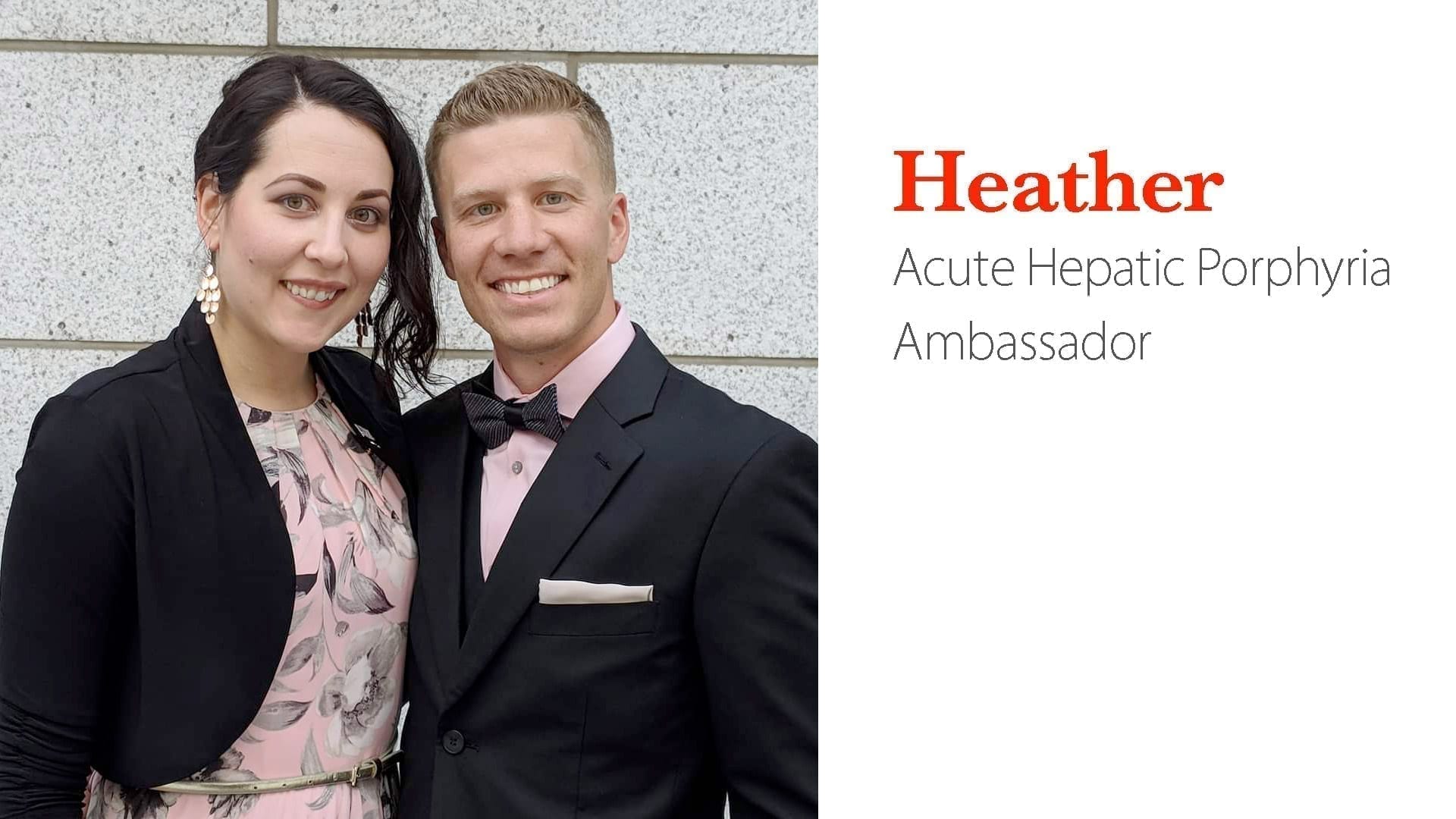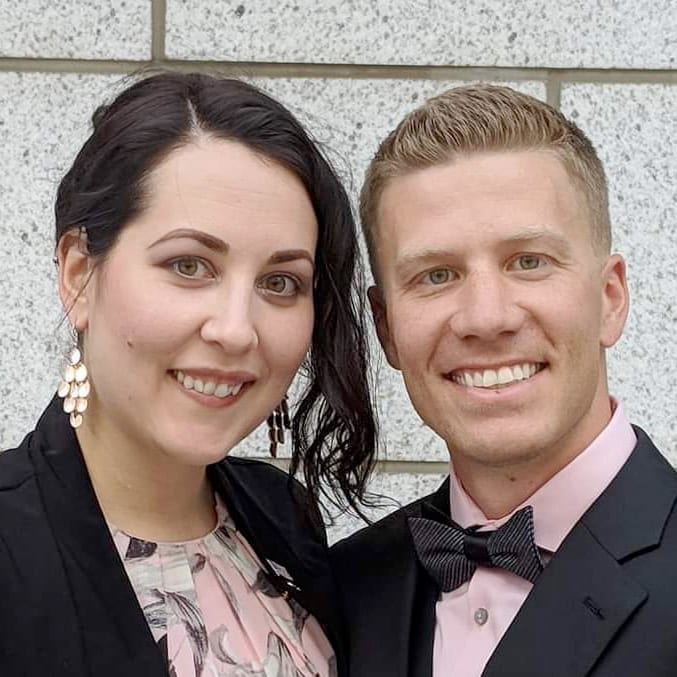Heather

Diagnosed with Acute Hepatic Porphyria (AHP)
After receiving an AIP (Acute Intermittent Porphyria) diagnosis at age 16, Heather struggled for years to manage her symptoms, experiencing multiple attacks a year. Even as AIP affected her physically, emotionally, socially, and financially, Heather never gave up on fighting for a better life and better care. She encourages others living with AHP to advocate for themselves.
My Story…
At 16 years old, I was a quiet, nerdy bookworm who was focused on getting good grades. My junior year, I enrolled in a nursing program, and I planned to graduate high school with my practical nursing certificate. My goal was to work as a nurse while going to college. I wanted to be a doctor or work in the public health field. I was fascinated by the human body, how it worked or didn’t work properly. Little did I know I would end up learning so much about the body and the healthcare system—from the patient side.
On the third day of eleventh grade, I stayed home from school sick—I thought I had the flu. But when I couldn’t stop throwing up, Mom took me to the emergency room. They ran a bunch of tests and couldn’t figure out what was wrong, so they admitted me with possible appendicitis. A week later, still no diagnosis.
My mom suggested they test me for a genetic disease that affected our family. She knew the name, porphyria, and knew that it was serious because her mom had died of it in the ’60s—my mom was only six months old. The doctor asked if she had been tested, and she hadn’t. Therefore, we were told, it was not possible that I had it. Even after my mom insisted, the doctor refused because porphyria was rare.
I have blurred memories of my family coming to visit me while I laid in that hospital bed in the fetal position. I was scared. And exhausted from the pain. So much pain, but the doctors didn’t want to give me anything because I was a child. One morning, my mom went to get breakfast and came back in a panic saying the World Trade Center had just been hit by a plane. I was so sick and disconnected from reality that I didn’t realize the gravity of 9/11. I thought I was going to die, and later that day, I had a seizure.
Being Officially Diagnosed…
My parents demanded I be moved to a bigger hospital, three hours from where we lived. There, a specialist ran the proper tests, and I was officially diagnosed with acute intermittent porphyria (AIP), which is a type of AHP. I was so relieved that I had a diagnosis, but I was also scared and confused about what it all meant. I had a disease. One I could barely pronounce, one I knew nothing about, one that was rare and that the doctors didn’t even know much about. Even so, I thought I’d get better and life would go back to normal. I’d soon find out how much my life would revolve around this new diagnosis.
The first two years after I was diagnosed, I had attacks once or twice a month. I would be hospitalized for at least a week, and the longest was six weeks. Every attack would start with a bad headache and fatigue. I’d experience changes in my personality, getting more irritable and aggressive. Then came the familiar aching, burning pain in my abdomen that felt like molten hot hands twisting my insides. Other symptoms included unbearable heaviness in my extremities and increased sensitivity to lights, sounds, and smells. I just wanted to sleep in a quiet, dark room forever.
The hospitals where we lived in rural New York couldn’t treat me, because the doctors weren’t familiar with AIP. So every time I had an attack, my parents drove three hours to the university hospital where I got diagnosed. I frequented the emergency room so regularly that I had standing orders for when I presented with an attack. The triage personnel and nurses knew me by name, and I had my favorites nurses.
Disease Management Options…
Those first two years, I tried every treatment option that my doctors suggested. I changed my lifestyle, my diet, and I tried medications to suppress my hormones. Nothing worked for me. I was in survival mode; I couldn’t fully recover from an attack before I was having another one. I spent every holiday and break from school in the hospital. I had to drop the nursing class and almost failed eleventh and twelfth grade.
Despite everything, I graduated high school on time, with honors, due partly to my teachers’ flexibility but also my own stubbornness and perseverance. That’s something you should know about me. I am a fighter. I don’t like failure, and I don’t give up.
After high school, my doctors figured out a management plan that included weekly treatments. I had to drive two hours to get the treatments, but it helped to reduce the number of hospitalized attacks. Instead of more than 14 attacks per year, I had between three to eight. With this new plan in place, I was hopeful my life would go back to normal. I applied to college on late admission and got accepted. It was a huge challenge, and I thought about giving up many times. Stress was a big trigger for me, I’d have an attack after every midterm, final, or large project. It took four-and-a-half years of classes and six-and-a-half years to graduate with a bachelor’s degree in community health. But I did it—I got my degree!
Despite my healthcare team actively managing my AHP, my health continued to decline over the years. I struggled with severe abdominal pain, nausea, inability to think clearly, extreme fatigue and weakness, a burning sensation of my skin, and sensitivity to sounds and smells. I had to quit several jobs, and for years, I struggled emotionally, physically, and financially. I just couldn’t keep living like that. I often felt completely hopeless.
Still, I was persistent about trying to improve my health. I wanted to know why I was so sick and what I could do to make my life better. Over the years, I saw many doctors. I was treated like a drug seeker, like I had a mental illness, or like I was making it up. I would hear, “You don’t look sick.” I talked to several experts from around the country, but most of them told me the same thing: I was already doing the right things and they had no answers as to why I was having frequent attacks. I just wanted my doctors to listen and try to understand. Honestly, that’s been one of my biggest struggles—I never felt like I had doctors who were compassionate and willing to fight for me. To figure out a plan to improve my quality of life. Or even acknowledge how sick I was. I was fighting to get my voice heard, but it felt like they didn’t see or understand how bad it was.
The Perfect Fit…
In the fall of 2009, I moved to a new state, and this turned out to be a huge blessing. I found an amazing hematologist and liver specialist. For the first time, I didn’t have to travel long distances for care. My new healthcare team worked with me to manage the pain and they worked on a plan to improve my quality of life.
Something else happened when I moved—I met my husband. But first, you have to understand how living with AIP affected my relationships. I lost friends because it was difficult to do things, and even more difficult to explain why I couldn’t do things. People my age were traveling, partying, and being carefree. I felt like a sick old lady who was married to my treatments and the hospital where I received them. I was constantly worrying about the food I was eating, if I was going to get a cold or the flu, and when the next attack was going to happen. Every decision I made had consequences.
Romantic relationships ended quickly. Men said my life was too hard or that I was too sick. I’ve chosen not to have my own children because I don’t want to risk passing on this disease, and that ended many relationships too. Dating with a rare disease is hard. It wasn’t just, “Oh, we’re not a good fit.” I felt rejected and hurt because of things I can’t even control. I was about ready to give up, but then I met Mike.
At the time, he was 23, new to the military, and a bit of a party animal. When I told Mike about my disease, his response was, “Well, everybody has baggage.” I tried explaining the struggles he would face and the sacrifices he would have to make, but he jumped right in—with no hesitation. I was so blown away, and I still am, thinking about it today.
Mike and I bonded much faster and deeper because dealing with everything we did forced us to go beyond the surface—to have real conversations and to show our real selves. We’ve been married [six] years now, and we’ve been through some really hard times. Mike has sacrificed so much, personally and even professionally. He has seen me at my worst. A lot. But when things got tough, he never took anything personally. He is the calmest person I have ever met, and his calming presence has made such a difference.
I know that being a patient is hard, but I think being a caregiver might be even harder. The patient has no choice, but the caregiver does—and they choose to stay and help and support. I’m so thankful for Mike, for all the caregivers out there. Nobody should have to walk this path alone.
Liver Transplantation…
About seven years ago, my doctors recommended a liver transplant. They warned me it was a difficult procedure and one that should not be pursued lightly. But after much consideration, I agreed because I couldn’t keep living the way that I was. I went to two different transplant centers before I found one willing and comfortable to perform the procedure. It took two-and-a-half years from my doctor recommending a transplant until I was placed on the transplant registry, but on October 31, 2015, I received a partial liver transplant.
Getting a transplant was a drastic procedure, and there were several complications during and after surgery, but I’m happy I did it. It has helped me manage my AIP symptoms. I’m able to work, travel, and be the wife my husband deserves. Remember that this is my personal experience—I know this is not a feasible option for everyone, and I also know many people do not have the energy or ability to be an advocate for their own health. That’s why I share my story.
I’m Proud of My Scars…
I share my story because people living with rare diseases have such a hard time getting their voices heard. But you are your best advocate. Nobody is going to be as passionate about changing your life as you. So keep fighting, even when things seem completely hopeless. There is hope, and there is help. Do not give up.
Today, I’m proud of my scars. They tell an amazing story of hardship, hopelessness, struggle, stubbornness, and perseverance. AIP has played such a large role in shaping me into the strong fighter I am today. Now, I’m happy to show my scars and to share my story with you.
Frequently Asked Questions
Before my transplant, my menstrual cycles and stress were two of my triggers. But I would have my period sometimes and not have an attack, so it wasn’t always the case. Same with stress. For me, I don’t think my attacks were brought on by any specific triggers.
- I worked with my care team to try to manage hormones through the years, but nothing worked.
- I also tried working out, reading, and doing other things to try to manage stress, but I never found a good way to avoid stress.
- I encourage you to work with your care team to try to manage your triggers.
Before my transplant, my symptoms were definitely getting worse every year, especially the pain and fatigue. Everything hurt. I had fewer and fewer good days over time.
Don’t lose hope, and educate your healthcare providers on what it’s like to have AHP. It’s so challenging to live with a rare disease and to have care providers not understand or know about AHP, but don’t lose hope. I think back to when I was first diagnosed and there were so few resources about AHP—I feel like there’s so much more available now.
I feel like so much of being a patient with a rare disease is educating your doctor on what it’s like to have AHP. Make sure you have someone who is open and willing to educate themselves about AHP and to try to understand what you’re going through. If you think that your doctor isn’t a good fit, maybe get a different doctor.
- I would explain that, if I’m in an attack, I have to be hospitalized, and I have to receive medication for pain management. Usually, I want to be a dark, quiet room with the door closed, and I don’t want to be disturbed for the first few days. I’d say, “I love you, and I know you love me, but I don’t want you coming to visit me.”
- That was really hard for friends and family to understand, because they really wanted to come support me. I just encouraged them to text me.
- AHP had a huge impact on my relationship with my family. When I was first diagnosed, my mom honestly blamed herself for passing the disease on to me. We had a difficult relationship the first couple years because she took everything personally and she felt responsible for my pain.
- AHP also affected my relationship with my siblings. Because I was sick all the time, I got a lot of attention from my parents, and that created a huge disconnect between me and my siblings. I also missed out on so many different things, and I wasn’t able to be there for my siblings.
- The biggest thing is communication. I really, really try to communicate with Mike as much as I possibly can, so he can understand how I’m feeling and why I need things to be a certain way. Because when your caregiver loves you, they’re going to do whatever they can to help you—when they understand what they’re doing, it helps.
- Give them space to not be your caregiver. There are times I’ll say to Mike, “I need you to go hang out with your friends. Do something that’s not taking care of me.”
Last Updated on January 21, 2021
Share this page






